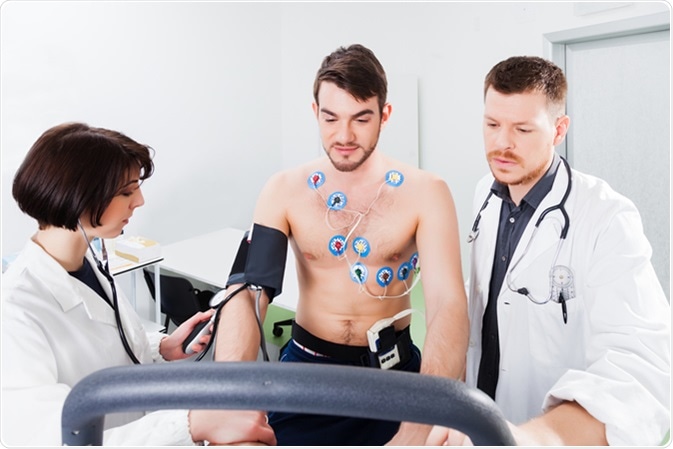A stress echocardiogram is an imaging test that monitors the functioning of the heart by inducing a stress test, a stimulus that facilitates a stressful environment within the heart. Through ultrasound waves, the physician is able to compare images of the heart before and after it was stressed, allowing the identification of any changes or abnormalities that may have been occurring.

Image Credit: Serafino Mozzo / Shutterstock
A stress echocardiogram specifically monitors the distribution of blood supply into the heart, as well as its viability and ability to perform its functions. The test is usually used to diagnose coronary artery disease. There are two types of stress echocardiography procedure, depending on the stressful stimuli; however, the physician should decide on the more appropriate method for the patient. Each procedure would usually take around 1-2 hours, exclusive of waiting time.
Stress Echo Treadmill Test
An exercise stress echocardiogram is a procedure that requires patients to walk into a treadmill with varying speeds, usually increasing in three-minute intervals. The exercise stops when the patient experiences exhaustion or when the targeted exercise level is reached. On the other hand, a pharmacological stress echocardiogram is a procedure that utilizes a medication called dubotamine to induce a stressful environment for the heart in the form of breathlessness or chest pain. Patients will also experience fast and pounding heartbeats after medicating.
Preparing for Stress Echocardiography
Because stress echocardiography is an uncomfortable procedure, patients are usually advised to do certain preparations prior to testing. The following are usually advised:
- Eat minimally at least two hours before the test – Patients are usually requested to eat less prior to the test. While some patients are allowed to eat fruit or toast, others are sometimes limited to only water or juice.
- Take necessary medications on time – Ensure that all medications given by the physician are taken on time, unless specified otherwise. It is also advisable to bring a list of current medications for the physician to easily factor in possible pharmacological contributors or regulators to the heart problem.
- Wear comfortable clothing – Because a stress echocardiogram may require physical activity, patients are advised to wear clothing that allows them to move around. Exercising in a hospital setup, patients are usually requested to wear comfortable footwear, jogging pants, and loose shirts.
- Allot at least half a day for the procedure – While a stress echocardiogram would usually only take 1-2 hours, patients are advised to allot more time for waiting, filling out forms, resting, and consulting with the physician.
Step-by-Step Procedure
A stress echocardiography would be facilitated with the aid of a medical technologist or sonographer. Prior to the start of the test, the medical technologist will first explain the process to the patient and clear out any question the patient may have about the procedure. The following details the complete stress echocardiogram.
- The patient will be asked to sign a consent form detailing his or her acceptance of the terms and processes involved in the procedure.
- The health personnel will record the patient’s blood pressure, heart rate, and electrocardiogram (ECG) prior to the test. These shall also be monitored throughout and after the procedure.
- All upper body clothing shall be removed, and the patient will be provided with a laboratory gown. Adhesive electrodes will be applied on the chest in order to monitor ECG signals. A mild abrasion may be utilized for better monitoring. Some echo scans may also require a contrast agent that improves the quality of scans.
- A nurse will insert an intravenous (IV) line into the patient’s arm, after which the medical technologist will apply a gel into the ultrasound area (usually at the left side of the chest). Images of the resting heart rate will be recorded. To do this, the medical technologist may apply pressure on the patient’s chest. The resting blood pressure, heart rate, and ECG will then be recorded.
- The patient will be asked to do a stress test, either by exercise or by the infusion of dubotamine. Patient monitoring will be done throughout the test. If a problem occurs, then the technologist will immediately stop the test.
- Echocardiogram images will be recorded at different times throughout and after the exercise. A cardiologist will review the images, provide specialist opinion, and a report shall be sent to patient’s doctors for treatment.
Further Reading
Last Updated: Feb 26, 2019